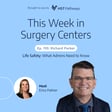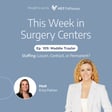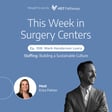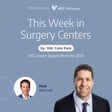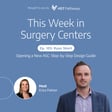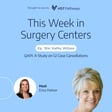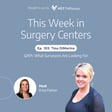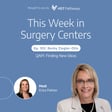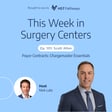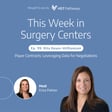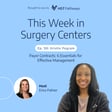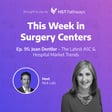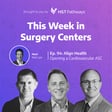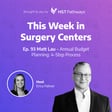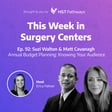Introduction and Episode Overview
00:00:01
Speaker
Welcome to This Week in Surgery Centers. If you're in the ASC industry, then you're in the right place. Every week, we'll start the episode off by sharing an interesting conversation we had with our featured guests, and then we'll close the episode by recapping the latest news impacting surgery centers. We're excited to share with you what we have, so let's get started and see what the industry's been up to.
Guest Introduction: James Calligan
00:00:27
Speaker
Hi, everyone. Here's what you can expect on today's episode. James Calligan is the president of Phoenix Gynecology Consultants, and he's on today to kick off our new three-part series about evaluating ownership options.
00:00:43
Speaker
So James runs what's called a management services organization or better known as an MSO, and they provide all types of support to their ASC clients. I feel like we're always talking about ASCs that are either independently owned or owned by a management company, but this third option, if you will, might be a great fit for ASCs out there looking for some sort of middle alternative.
News Recap and Healthcare Trends
00:01:07
Speaker
In our news recap, we'll cover top healthcare trends executives are watching, the new partnership between ChristianaCare and Atlas Healthcare care Partners, talk through some staffing projections, and of course, end the new segment with a positive story about a 15-year-old boy who was named Times Kid of the Year for his latest invention. Hope everyone enjoys the episode, and here's what's going on this week in Surgery Centers.
Interview with James Calligan
00:01:36
Speaker
Hi James, welcome to the show. Hi, how are you? Good. Thanks. Super excited to have you on today because you are actually kicking off our latest podcast series, which is all about evaluating management options to get us started. Can you please share a little bit about Phoenix gynecology consultants and the services you all provide? Yeah, of course. And thank you so much for having me on.
00:02:00
Speaker
Phoenix Gynecology Consultants, we provide MSO services to multiple different specialties, including um ambulatory surgery centers. We do outpatient clinics, and then we do some consulting work around revenue cycle for a number of different groups.
00:02:18
Speaker
Very cool. So what are, because I feel like we talk about, when we think about management options, ah historically, I feel like ASEs are typically bucketed into two categories, independence and people owned by a management group. But and MSOs offer this other option. So what are the key services that an MSO does typically provide to a surgery center?
00:02:41
Speaker
Yeah, it can vary depending upon the MSO, what their ah capabilities are. I could certainly speak to what we can offer um to ASCs. And the great thing about going with an MSO is that it allows the ASC to still have that independence. And then as a third party coming in contracting with them for a whole number of different reasons. So we do revenue cycle management. so we From start to finish A to Z, we can, we help with eligibility. We can run verification, patients out of pocket, good faith estimates from start to finish on that. We provide financial services. So we do a lot of the accounting for our clients. So we'll do but um bookkeeping,
00:03:26
Speaker
data entry, keeping up with that type of aspect. And then we have a a partner that handles the CPA that handles the. statements and and things of that nature, ah income statements and what you would typically get.
00:03:41
Speaker
We have an employee leasing agreement. So all of the staff is actually employed by Phoenix Gynecology Consultants for the ASC that we work closely with. So we manage reviews, payroll, every HR component for every staff member that works out of that ASC. Again, it just it provides um that ASC flexibility where they don't have to bring on an HR representative and have certain oversight for many components of the ASC. We have clinical oversight and daily operations. So we hire, but we have a director of nursing that we typically would hire, train, and then place in the ASC. And then there would be our eyes and ears inside the ASC to ensure operational efficiency and compliance.
00:04:28
Speaker
We help and support the scheduling aspect, efficiencies in the OR. We have OR managers. We support purchasing, ordering, inventory management. So a whole yeah mark, um we we do a lot of work with their websites or getting their name out in the community, whether that's from a network perspective or actually print material.
00:04:52
Speaker
so A lot of different options. It really just depends on what the ASC need is, what their direction is, and then how can we meet that need with our team. I would imagine the staffing component is extremely beneficial right now. I feel like we're always talking about all the staffing shortages going on. So to be able to outsource that to you guys but much be must be such a relief for your clients.
00:05:17
Speaker
Yeah, it certainly is. There's several different options. I think a lot of ASCs will have per diem or there's a lot of staffing companies out there. The great thing with us is they're going to have the same staff each and every case, which just builds efficiency and dependability.
00:05:32
Speaker
Predictability in the OR is of extreme importance. So every case day, they're not getting different staff and and meeting them for the first time. They can build that trust and overall just ah produce a better patient experience, which is crucial in part of our outlook and how we can apply our services to ASCs.
Understanding MSO Financial Agreements
00:05:52
Speaker
Definitely. So how do MSOs typically structure their financial agreements with the surgery centers they work with?
00:06:01
Speaker
Yeah, there's many options out there in the market. For us, we have a management agreement. So yeah, we just parse out specific services that our clients want. So some clients may want to, they may have a third party that does the revenue cycle that they're happy with. And it it, it would turn more into an employee lease agreement where they're employees of Phoenix Gynecology consultants, but they represent surgical as on the daily basis.
00:06:29
Speaker
We're a limited liability company. We, we structure it around either a percentage of revenue. We could do a ah per hour rate for staff members. So we're highly flexible in meeting exactly what the need is of the ASC out there.
00:06:46
Speaker
Gotcha. So I guess, so outside of the labor costs, let's say, of all the staff you're bringing in for them, for all kind of like the ah HR, the marketing, all those additional services, is that usually just a set monthly fee or is that charged hourly as well? What we find is ASCs have different needs at different times. They may go into a season where they want to increase their case utilization. And so they may want more of that marketing component.
00:07:15
Speaker
And so we have all a la carte options to help support a specific season, or let's say they're coming up on a walkthrough for an accreditation. We have me Medicare surveyors on our team that can actually go out do mocks. And those services are more of a per DM. We also have an all inclusive kind of service package where we can manage the whole kit and caboodle, so to speak, of everything that's involved in running the ASC on a daily basis.
00:07:42
Speaker
Got it. So genuinely flexible options. Yeah. That's what makes it great is to really meet the ASC where they're at and bring them forward to where they want to go is how we've designed our MSO. And so it's not like a one size fits all. There's a number of different ASCs out there with specific needs that we try to um source and work through with them. Sure.
Deciding to Join an MSO
00:08:08
Speaker
So if there's a surgery center listening right now who is intrigued, what factors should they consider when deciding whether to join an MSO or if this structure is best for them?
00:08:22
Speaker
Yeah, I think it's important to have credibility and a proven track record. I think first and foremost, understanding what types of clients have they had in the past? What projects have they seen from start to finish? And then really getting a good reference point from clients that they've worked with in the past, any issues, concerns, basically understanding their full capability.
00:08:44
Speaker
Making sure that the MSO is outfitted to meet the need. I think oftentimes if the MSO doesn't specifically have a service or there they might be undersized, will they be able to meet the need of the ASC for kind of what they're gonna contract with them for? I think those are the most important things is understanding has the MSO done this work before and what successes have they seen or ah opportunities are there um with the work that they've done.
Benefits of MSOs for Physicians
00:09:14
Speaker
Sure. And what are some of the primary reasons you typically see physicians wanting to go the MSO route versus other options handling everything in-house or selling some equity to a management group?
00:09:32
Speaker
Yeah, I would say certainly one of the big benefits is just having control and independence. And it's more so for ASCs that don't really want the PE to step in and dictate how operations are going to go. I think we are very physician centric, meaning we want to pay very close attention to the physician's experience in the OR and how that operation takes place.
00:09:56
Speaker
And so I think having that independence and being able to work closely with the MSO ah to provide direction and kind of a holistic picture of how they envision that ASC to deliver services to their patients, I think is one aspect. The other one that we find is a lot of times an ASC would have to go out and recruit some top talent to really get a great Medicare surveyor or a great director of nursing, an HR person.
00:10:25
Speaker
And they just don't have that capacity. So what we see is you have a really capable person, but that has multiple hats and roles. What we're able to do is go out, attract top talent, bring in a marketing director who has that background. And then we're able to utilize him for multiple ASCs. And they know the the market well, they know what the need is, what's speaking to patients. And that's an example for marketing, but.
00:10:51
Speaker
but In all aspects, revenue cycle, HR, the marketing perspective, compliance, the day-to-day operational efficiencies of the ASC, just having that leadership and experience that's backed with an MSO thats that's done it before, I think provides a lot of value and you're not spreading the physician or maybe their director too thin to where they can focus really on that patient care and being able to communicate effectively with the ASC or excuse me, the MSO with what their need is and how we can bridge that gap.
MSOs in Vendor Management and Technology
00:11:26
Speaker
Yeah. And I'm curious when your client comes to you with whatever they're struggling with or or need your advice on, do you ever make technology recommendations to them and help them go through like the vendor selection process or anything like that?
00:11:42
Speaker
Yeah, that's a great call-out. We do a lot of vendor management. That's part of a service that we offer too, whether that's services that are off it or vendors that come to the ASC for linen or water delivery, even those kind of low value. But in addition, software, that's software and IT technology, understanding their patient demographic, what is and isn't working depending upon what the need is. I could use one example.
00:12:08
Speaker
is just communicating with patients. It's really challenging these days. um Patients don't answer their phones. There's so many robocalls, and if they don't identify the number that's coming in, it's really hard getting a hold of them. Confirming you know appointment times and surgery times, et cetera, making sure that they have technology where they can text message and provide other avenues to reach the patient is an example that we've helped one client with. And so we went through a process of identifying potential vendors that they can work with and help them sort through what would work for them financially. There's considerations. Have we integrated with that vendor in the past and to be able to make an informed, educated decision on on what's right for the ASC?
00:12:54
Speaker
Yeah, very cool. Cause we run into a lot of situations, a lot of times where these admins know they want X, Y, and Z, but they've never gone through like the software purchasing process or evaluating vendors. And it could be really overwhelming to know what's legit. And is it worth making this investment? So I would imagine having someone to guide them through that process is extremely helpful.
00:13:19
Speaker
Yeah, we go through the ah RFI RFP kind of process. So request for information and then a proposal after that. And we're able to do a lot of the legwork to provide an end result that the ASC can choose. And then we help support the implementation and make it go live.
MSO Support for Board Meetings
00:13:38
Speaker
And another thought that popped into my head as you were going through the services at MSO could offer, do you help or have a role in the quarterly board meetings at all? Because we've been talking to a bunch of clients lately about just how to improve their board meetings and what metrics physicians want to see, how to make them productive. And it's such a headache sometimes. So do you provide any help there?
00:14:01
Speaker
We do from a reporting standpoint. So we provide executive summaries of key reports, whether that's quality measures, revenue data, infection rates, normal normal things that an ASC would want to report on the board level. We generally don't sit in on the board meetings, but that's certainly something that, you know, we could consider or look into to, to help ASCs. Sure. All right. Before we wrap up, am I missing anything about MSOs?
00:14:31
Speaker
that we should definitely cover. I think just understanding, I think just having ASCs understand that they're out there as a kind of a third option to your point from the traditional two. And I find them highly effective. We're in that business. We've helped a number of different ASCs from urology, gynecology, we've helped interventional radiology, like just and being able to One, know that they're there. Two, that it it could be a very sound option for them, both financially and and still having that say and control over the direction of their ASC. And so I think that's first and foremost for for that. So yeah. Perfect. All right, James, we do this every week with our guests. What is one thing our listeners can do this week to improve their surgery centers?
00:15:21
Speaker
Yeah, it's a great question. I love that you guys do this. I think giving appreciation to staff, I'm going to go with that one. I think just understanding that it's such a, it can be stressful environment inside the OR and just physicians, leaders being able to recognize staff and and praise them for their efforts and just their the work that they do for patient care, like it's bigger than just a job. And I think if we treat our people well, I think we we see that return um on the other side. That is great advice. Thank you so much for coming on today and for all the interesting information you shared. Yeah, of course. Thank you for having me.
Healthcare Trends Impacting Executives
00:16:08
Speaker
As always, it has been a busy week in healthcare, so let's jump right in. As we move through 2024, healthcare leaders are closely monitoring several key trends impacting the industry. Now, this article by Health Leaders Media was written for hospitals and healthcare systems, but as I was reading through it, I realized they all impact surgery centers as well. So here we go. Here are the top eight trends impacting healthcare executives right now.
00:16:38
Speaker
The first, which will come as no surprise, is just mounting financial pressure. So healthcare systems are struggling with rising costs, particularly when it comes to labor and drugs. So labor expenses increased by over $42 billion dollars between 2021 and 2023. And then drug shortages reached a decade high in 2023 at the same time, which of course means financial strain.
00:17:04
Speaker
The second is physician and nursing shortages. The U S is facing a critical shortage of up to 124,000 physicians and 450,000 nurses by 2025.
00:17:17
Speaker
Now, the third article I will share in a little bit also talks about staffing shortages. Every study, every article that I've read has always had different numbers that they're estimating um the shortage currently is or projected to be by the end of the year, the end of the decade, whatever it might be. So take all of the numbers I'm sharing with a grain of salt, but obviously as you're experiencing firsthand, shortages do exist in general.
00:17:44
Speaker
ah So healthcare leaders are focused on recruitment strategies and improving working conditions to combat this crisis. The third is a rising influence of payers. So insurers are gaining leverage over hospitals, which is making reimbursement negotiations super hard and providers are feeling the squeeze facing delayed payments and tighter reimbursement policies.
00:18:09
Speaker
The fourth is regulatory and policy changes. So shifting regulations like price transparency and potential drug pricing reforms are challenging leaders.
00:18:20
Speaker
There's been a surge in M and&A activities, so mergers and acquisitions are on the rise as everyone is looking for financial relief while also hoping to improve operational efficiencies. Non-traditional competitors are popping up, so digital health companies and retail giants are emerging as strong competitors, offering cost-effective and convenient care.
00:18:44
Speaker
The seventh trend is technology and digital transformation. So hospitals are increasingly investing in digital tools, again, so are ASEs, to enhance patient care and operational efficiencies. This could be anywhere from self-scheduling platforms to improving care coordination, but technology will be at the core of staying competitive.
00:19:06
Speaker
And then the eighth and final trend would be workforce recruitment and retention. So again, those ongoing staff shortages, we're all focusing on reducing burnout and improving working conditions. And then going back to those that technology, investments in tech do ease some administrative burdens and enhance staff workflows, which can help to retain talent.
00:19:28
Speaker
So those are the eight trends and honestly, these are tough. There's no easy solution to any of them. But when I think about ASC leaders leaders, two things really come to mind. The first is you have to remain focused and hopeful on the things you can control, such as your current staff, making sure they're happy and care for.
00:19:50
Speaker
focus on how you can control their day-to-day experience. So what are their pain points? What can you automate for them? um And then the second, with all the regulatory changes and pressures and reimbursement cuts, you have to stay connected to your your peers. So whether that's through your state association, lean on them, lean on ASCA, help them help you stay up to date and connected with your peers. And if there's anything that you're losing sleep at night over,
00:20:18
Speaker
which I'm sure there are, don't suffer in silence because there are are others who can relate or even help. If you're not on, if you're a part of ASCA, you get access to ASCA Connect. The forum there is full of ideas, full of your peers who are dealing with some of the same issues, giving each other tips and tricks. So again, my advice to you, stay focused on what you can control and and stay connected with the industry so you can get ahead of these things and learn from your peers.
00:20:49
Speaker
All right, story number two.
New Joint Ventures and Healthcare Partnerships
00:20:50
Speaker
A few weeks ago, Christiana Care and Atlas Healthcare care Partners announced a new joint venture aimed at expanding a network of ASCs in Delaware and the Mid-Atlantic region. So Jennifer Schwartz, who is Christiana Care's Chief Strategy Officer, emphasized the importance of ASCs, citing their ability to provide affordable, high-quality care closer to patients' homes.
00:21:14
Speaker
And then Eric Burke, the CEO of Atlas Healthcare care Partners noted that this partnership aligns health systems, physicians, and ASCs to deliver exceptional patient experiences and outcomes. And then he also shared that the joint venture will operate with its own board and will feature representatives from both organizations.
00:21:38
Speaker
So why does this matter? This partnership I think is meaningful because it just continues to reflect a growing trend towards outpatient care and specialized centers. As we've shared a bunch of times and as you all know, more more and more procedures are moving out of hospitals and into ASCs. So partnerships like this are crucial in meeting that patient and also the payer demand. And obviously, studies show that patients rate ASCs higher in satisfaction compared to hospitals, and some payers will only authorize certain procedures to be done in an outpatient setting. So we need options. So by combining Christiana Care's established infrastructure and Alice's experience in developing and managing ASCs, the partnership is a super exciting one for this area of the country.
Healthcare Worker Shortage Projections
00:22:25
Speaker
All right, our next story, as I mentioned, we covered this a little bit in story number one, but let's go back to some of these worker and labor shortages. So this is a different study. This one was done by Mercer. Mercer is sharing that we can anticipate a shortage of over 100,000 critical healthcare workers by the end of this decade.
00:22:47
Speaker
And what I found to be super interesting in this story is that certain states will bear the brunt of this. New York, New Jersey, and Tennessee are projected to be the hardest hit while other states like California, Pennsylvania, and Texas may actually see a surplus of workers. So finally, ah a little bit of positivity, a little bit of hope when it comes to the staffing shortage.
00:23:08
Speaker
Nursing assistants are expected to be among the most affected with a projected shortage of 73,000 by 2028. And while the nation's physician and registered nurse populations are expected to grow and see a surplus by 2028, shortages will still be a challenge in specific regions. So again, for that specific role, we're looking at New York, Tennessee, and Massachusetts that will experience a scarcity of registered nurses.
00:23:38
Speaker
So what can healthcare employers do about this looming issue? There are staffing agencies out there who offer several different solutions to address all these challenges and help also help prevent burnout with your existing staff, which we know is a significant issue. The article also recommends employers focus on the wellbeing of their employees early on.
00:24:00
Speaker
So pay, benefits, flexible scheduling, promoting career growth opportunities, and just really leaning into that job satisfaction. And then you also want to expand your recruitment efforts across regions that could help alleviate some pressure as well.
00:24:17
Speaker
And if you're looking for more staffing tips, that will actually be the focus of three podcast episodes in November. I have three ASC leaders coming on to share their staffing strategies. So make sure you subscribe to the podcast so you can learn from them and hopefully get some good ideas.
Invention Spotlight: Time's Kid of the Year
00:24:35
Speaker
And to end our new segment on a positive note.
00:24:38
Speaker
15-year-old Heyman Beckola from Virginia has been named Time Magazine's Kid of the Year for his groundbreaking work in skin cancer treatment. Haman's passion for science started at just four years old when he started conducting experiments at home. Growing up in and Ethiopia, he witnessed the harsh effects of the sun on outdoor laborers and was struck by the high cost of skin cancer treatment, which can reach $42,000 without insurance. Determined to make a difference, Haman created a soap infused with the drug imiquimod,
00:25:14
Speaker
Please forgive me if I'm pronouncing that wrong. It's typically used in creams to treat early stage skin cancer. And his goal was to make treatment more affordable and accessible, particularly for those in developing regions. So Heyman's Innovation actually won him the 3M Young Scientists Challenge and a $25,000 prize.
00:25:35
Speaker
He now collaborates with molecular biologist Vito Rebecca at Johns Hopkins University to further research the soap's effectiveness. Heyman said he hopes his work will one day have a direct impact on those in need. And he also said, and I quote, a lot of people have this mindset that everything's been done. There's nothing left for me to do.
00:25:56
Speaker
To anybody having that thought, I'd say we'll never run out of of ideas in this world. Just keep inventing, keep thinking of new ways to improve our world and keep making it a better place. And that officially wraps up this week's podcast. Thank you as always for spending a few minutes of your week with us. Make sure to subscribe or leave a review on whichever platform you're listening from. I hope you have a great day and we will see you again next week.

